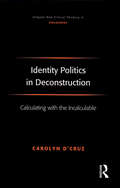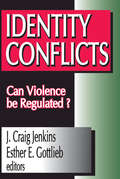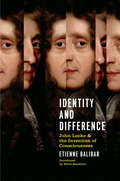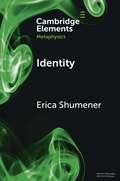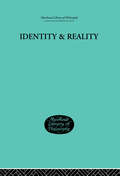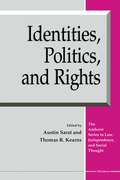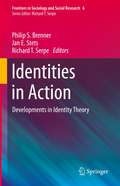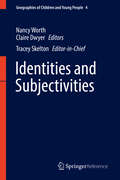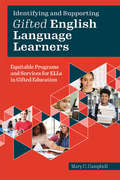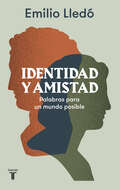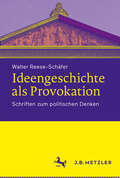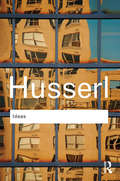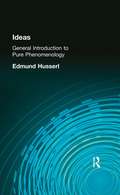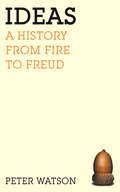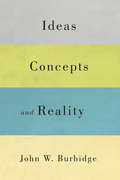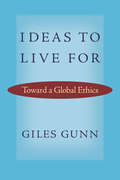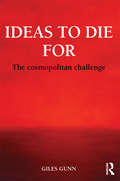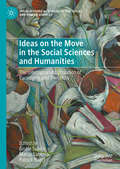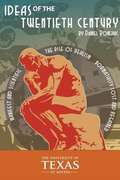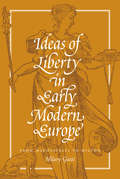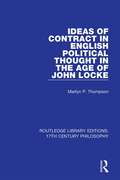- Table View
- List View
Identity Politics in Deconstruction: Calculating with the Incalculable (Ashgate New Critical Thinking in Philosophy)
by Carolyn D'CruzIdentity politics dominates the organisation of liberation movements today. This is the case whether fighting over one's birthright to a nation, such as in the Palestinian/Israeli conflict; lobbying for civil rights, such as in gay and lesbian campaigns for marriage; or struggling for citizenry recognition as currently experienced by asylum seekers. In this book Carolyn D'Cruz investigates the nexus between what David Birch describes as ’the seemingly impossible of high theory and the seemingly accessible possibilities of popular discourse’, as encountered in liberation movements based on identity. D'Cruz reworks the logic of such movements through the unique combination of Derridean deconstruction, Foucauldian discourse and Levinasian ethics. Moving both within and between the domains of philosophy, politics and ’postmodern culture’ this book offers both a clear explication of complex philosophical issues and an understanding of how they relate to the political practicalities of everyday life.
Identity Conflicts: Can Violence be Regulated?
by Esther GottliebSocial conflicts are ubiquitous and inherent in organized social life. This volume examines the origins and regulation of violent identity conflicts. It focuses on the regulation of conflict: the constraining, directing, and repression of violence through institutional rules and understandings. The core question the authors address is how violence is regulated and the social and political consequences of such regulation. The contributors provide a multidisciplinary multi-regional analysis of identity conflicts and their regulation. The chapters focus on the forging and suppression of religious and ethnic identities, problematic national identities, the recreation of identity in post-conflict peace-building efforts, and the forging of collective identities in the process of democratic state building. The instances of violent conflict treated here range across the globe from Central and South America, to Asia, to the Balkans, and to the Islamic world. One of the key findings is that conflicts involving religious, ethnic, or national identity are inherently more violence prone and require distinctive methods of regulation. Identity is a question both of power and of integrity. This means that both material and symbolic needs must be addressed in order to constrain or regulate these conflicts. Accordingly, some chapters draw on a political-economy approach that places primary emphasis on resources, organization, and interests, while others develop a cultural approach focusing on how identities are constructed, grievances defined, blame attributed, and redress articulated. This volume offers new ideas about the regulation of identity conflicts, at both the global and local level, that engage both tradition and modernization. It will be of interest to policymakers, political scientists, human rights activists, historians, and anthropologists.
Identity And Difference
by Etienne BalibarJohn Locke's foundational place in the history of British empiricism and liberal political thought is well established. So, in what sense can Locke be considered a modern European philosopher? Identity and Difference argues for reassessing this canonical figure. Closely examining the "treatise on identity" added to the second edition of An Essay Concerning Human Understanding, Étienne Balibar demonstrates Locke's role in the formation of two concepts central to the metaphysics of the subject--consciousness and the self--and the complex philosophical, legal, moral and political nature of his terms.With an accompanying essay by Stella Sandford, situating Balibar's reading of Locke in the history of the reception of the Essay and within Balibar's other writings on "the subject," Identity and Difference rethinks a crucial moment in the history of Western philosophy.
Identity (Elements in Metaphysics)
by Erica ShumenerIdentity criteria are powerful tools for the metaphysician. They tell us when items are identical or distinct. Some varieties of identity criteria also try to explain in virtue of what items are identical or distinct. This Element has two objectives: to discuss formulations of identity criteria and to take a closer look at one notorious criterion of object identity, Leibniz's Law. The first section concerns the form of identity criteria. The second section concerns the better-regarded half of Leibniz's Law, the indiscernibility of identicals. The third section turns to the more controversial half of Leibniz's Law, the identity of indiscernibles. The author considers alternatives to Leibniz's Law as well as the possibility that there are no adequate identity criteria to be found.
Identity & Reality
by Meyerson, EmileFirst published in 2002. Routledge is an imprint of Taylor & Francis, an informa company.
Identities, Politics, and Rights
by Austin Sarat Thomas R. KeamsThe subject of rights occupies a central place in liberal political thought. This tradition posits that rights are entitlements of individuals by virtue of their personhood and that rights stand apart from politics, that rights in fact hold at bay intrusions of state policy. The essays in Identities, Politics, and Rights question these assumptions and examine how rights constitute us as subjects and are, at the same time, implicated in political struggles. In contrast to the liberal notion of rights' universality, these essays emphasize the context-specific nature of rights as well as their constitutive effects. Recognizing that political disputes throughout the world have increasingly been cast as arguments about rights, the essays in this volume examine the varied roles that rights play in political movements and contests. They argue that rights talk is used by many different groups primarily because of its fluidity. Certainly rights can empower individuals and protect them from their societies, but they also constrain them in other areas. Frequently, empowerment for one group means disabling rights for another group. Moreover, focusing on rights can both liberate and limit the imagination of the possible. By alerting us to this paradox of rights--empowerment and limitation--Identities, Politics, and Rights illuminates ongoing challenges to rights and reminds us that rights can both energize political engagement and provide a resource for defenders of the status quo.
Identities in Action: Developments in Identity Theory (Frontiers in Sociology and Social Research #6)
by Jan E. Stets Richard T. Serpe Philip S. BrennerThis volume presents recent developments in identity theory and research. Identities are the basic building blocks of society and hold a central place in every social science discipline. Identity theory provides a systematic conceptualization of identities and their relationship to behavior. The research in this volume demonstrates the usefulness of this theory for understanding identities in action in a variety of areas and settings. The volume is organized into three general areas: ethnicity and race; family, religion, and work; and networks, homophily, and the physical environment. This comprehensive and authoritative volume is of interest to a wide readership in the social and behavioral sciences, including students and researchers of sociology, social psychology, psychology, and other social science disciplines.
Identities and Subjectivities
by Nancy Worth Claire DwyerGeographies of children and young people is a rapidly emerging sub-discipline within human geography. There is now a critical mass of established academic work, key names within academia, growing numbers of graduate students and expanding numbers of university level taught courses. There are also professional training programmes at national scales and in international contexts that work specifically with children and young people. In addition to a productive journal of Children's Geographies, there's a range of monographs, textbooks and edited collections focusing on children and young people published by all the major academic presses then there is a substantive body of work on younger people within human geography and active authors and researchers working within international contexts to warrant a specific Major Reference Work on children's and young people's geographies. The volumes and sections are structured by themes, which then reflect the broader geographical locations of the research.
Identifying and Supporting Gifted English Language Learners: Equitable Programs and Services for ELLs in Gifted Education
by Mary CampbellThis book is a practical guide for identifying and supporting gifted English language learners (ELLs) based on research and firsthand teaching experience. This book:Presents practical information and strategies for identifying gifted ELLs.Helps readers understand more about potentially gifted behaviors and talents.Supports the enrichment and social-emotional needs of these students.Includes background information, teaching strategies, and methods.Offers ideas for lessons and activities that can be used to support any learner.Research from the last 2 decades shows that there is a considerable disparity between ELLs and native English speakers identified as gifted. This book will inspire action by key players in these students' lives, including English language and gifted educators, classroom teachers, school administrators, district and state leaders, families, and the greater community.
Identidad y amistad: Palabras para un mundo posible
by Emilio LledóPREMIO PRINCESA DE ASTURIAS DE COMUNICACIÓN Y HUMANIDADES 2015 PREMIO NACIONAL DE LAS LETRAS ESPAÑOLAS 2014 Un acontecimiento muy esperado: el ensayo al que Lledó se ha dedicado durante los últimos diez años. «En la otra ladera del dolor y la desesperación se dibuja el horizonte sorprendente de la amistad». En uno de los momentos más emocionantes de la Ilíada, Príamo reclama a Aquiles el cadáver de su hijo Héctor. En el tenso diálogo entre ambos, surge un destello de humanidad y Aquiles rinde honores al héroe muerto ofreciendo hospitalidad al anciano padre. A pesar de la guerra, nos dice Emilio Lledó, Homero nos deja atisbar el horizonte de la amistad, «que acoge y sublima el dolor de la muerte». La libertad de las personas guarda una estrecha relación con la libertad de las palabras, pues implica posibilidad de pensar, posibilidad de ser. En este maravilloso ensayo, Lledó juega y conversa con los numerosos términos que la cultura griega nos ha legado, y se detiene en el de amistad, un concepto clave a la hora de explorar quiénes somos. Lo contrapone a otra noción esencial, la de identidad, hoy tan manida y viciada, que, en su origen, lejos de aludir a lo que nos diferencia, se refería a nuestra mirada humana sobre el mundo y sobre nosotros mismos, y es un componente fundamental de la democracia. Lledó rastrea ambos conceptos en las fuentes clásicas, trazando maravillosas conexiones entre ellos -así como con el resto de grandes palabras- y profundizando en sus sucesivas interpretaciones. Al hacerlo, ofrece una lúcida visión de la vida moderna. La crítica ha dicho:«Si hubiera muchos intelectuales como Lledó el nuestro sería un país bien distinto.»Elvira Lindo
Ideengeschichte als Provokation: Schriften zum politischen Denken
by Walter Reese-SchäferIdeengeschichte ist die Grundlage jeder Ideenpolitik. Sie ist nur interessant durch ihren grundsätzlichen Gegenwartsbezug. Ideen können gefährlich sein, denn sie haben Konsequenzen, wenn sie die Wahrnehmungen leiten. Darin liegt eine der großen Provokationen. Ideen haben eine weltgestaltende Energetik. Dadurch sind sie alles andere als bloße Derivate. In der Ideengeschichte haben wir es immer auch mit der Politik selbst zu tun, wie sie uns in der Empirie der Texte gegenübertritt. Politische Ideen und Begriffe wie Reform, Anarchie oder Heimat leiten überhaupt erst die Auswahl der Fakten und Belege, die dann mit diversen Methoden erfasst werden können. Da die Ideengeschichte auf der Materialseite vorwiegend mit Texten arbeitet, provoziert sie den Unwillen jener, die glauben, einen unmittelbareren, nämlich dinglicheren oder archäologischen Wirklichkeitszugang bereitstellen zu können. Ideengeschichte ist im Gegensatz dazu als Primärwissenschaft zu betrachten, die den fleißigen Sozialwissenschaftlern erst ihre Leitkategorien liefert, die dann in der praktischen Forschung meist sehr viel gröber und trivialer verwendet werden als in der primären Textgestalt. Sie ist damit das Gegenteil einer bloß archivalischen Sammlung vergangener Meinungen. Die relative Unmittelbarkeit des Textfundus ist zugleich immer eine Herausforderung gegen ein Priestertum des elitären Zugriffs. Natürlich gibt es immer wieder neue Ideen. Das wird aber erst erkennbar vor dem Kontext und Hintergrund alles Übrigen. Auf diese Weise kann Ideengeschichte auch eine allzu zeitgebundene Selbstüberschätzung erschüttern und so ein Gegengewicht bieten gegen modisches opinion mainstreaming. Ideengeschichte ist keine bloße Nebentätigkeit des politischen Geistes, sondern sie muss eine Zentralstellung im politischen Denken beanspruchen.
Ideas: General Introduction to Pure Phenomenology (Routledge Classics)
by Edmund HusserlWith a new foreword by Dermot Moran ‘the work here presented seeks to found a new science – though, indeed, the whole course of philosophical development since Descartes has been preparing the way for it – a science covering a new field of experience, exclusively its own, that of "Transcendental Subjectivity"’ - Edmund Husserl, from the author’s preface to the English Edition Widely regarded as the principal founder of phenomenology, one of the most important movements in twentieth century philosophy, Edmund Husserl’s Ideas is one of his most important works and a classic of twentieth century thought. This Routledge Classics edition of the original translation by W.R. Boyce Gibson includes the introduction to the English edition written by Husserl himself in 1931. Husserl’s early thought conceived of phenomenology – the general study of what appears to conscious experience – in a relatively narrow way, mainly in relation to problems in logic and the theory of knowledge. The publication of Ideas in 1913 witnessed a significant and controversial widening of Husserl’s thought, changing the course of phenomenology decisively. Husserl argued that phenomenology was the study of the very nature of what it is to think, "the science of the essence of consciousness" itself. Husserl’s arguments ignited a heated debate regarding the nature of consciousness and experience that has endured throughout the twentieth and continues in the present day. No understanding of twentieth century philosophy is complete without some understanding of Husserl, and his work influenced some of the great philosophers of the twentieth century, such as Martin Heidegger and Jean-Paul Sartre.
Ideas: General Introduction to Pure Phenomenology (Routledge Classics Ser.)
by Edmund HusserlThis is Volume X of twenty-two in a collection of works on 20th Century Philosophy in the Library of Philosophy which was designed as a contribution to the History of Modern Philosophy under the heads: first of Different Schools of Thought-Sensationalist, Realist, Idealist, Intuitivist; secondly of different Subjects-Psychology, Ethics, Political Philosophy, Theology. Originally published in 1932, this volume offers a general introduction to pure phenomenology.
Ideas: A History
by Peter WatsonA highly ambitious and lucid history of ideas from the very earliest times to the present day.In this hugely ambitious and exciting book Peter Watson tells the history of ideas from prehistory to the present day, leading to a new way of telling the history of the world. The book begins over a million years ago with a discussion of how the earliest ideas might have originated. Looking at animal behaviour that appears to require some thought: tool-making, territoriality, counting, language (or at least sounds), pairbonding. Peter Watson moves on to the apeman and the development of simple ideas such as cooking, the earliest language, the emergence of family life. All the obvious areas are tackled: the Ancient Greeks, Christian theology, the ideas of Jesus, astrological thought, the soul, the self, beliefs about the heavens, the ideas of Islam, the Crusades, humanism, the Renaissance, Gutenberg and the book, the scientific revolution, the age of discovery, Shakespeare, the idea of Revolution, the Romantic imagination, Darwin, imperialism, modernism, Freud right up to the present day and the internet.
Ideas: A History
by Peter WatsonA highly ambitious and lucid history of ideas from the very earliest times to the present day.In this hugely ambitious and exciting book Peter Watson tells the history of ideas from prehistory to the present day, leading to a new way of telling the history of the world. The book begins over a million years ago with a discussion of how the earliest ideas might have originated. Looking at animal behaviour that appears to require some thought: tool-making, territoriality, counting, language (or at least sounds), pairbonding. Peter Watson moves on to the apeman and the development of simple ideas such as cooking, the earliest language, the emergence of family life. All the obvious areas are tackled: the Ancient Greeks, Christian theology, the ideas of Jesus, astrological thought, the soul, the self, beliefs about the heavens, the ideas of Islam, the Crusades, humanism, the Renaissance, Gutenberg and the book, the scientific revolution, the age of discovery, Shakespeare, the idea of Revolution, the Romantic imagination, Darwin, imperialism, modernism, Freud right up to the present day and the internet.
Ideas, Concepts, and Reality: Ideas, Concepts, And Reality (McGill-Queen's Studies in the History of Ideas #58)
by John W. BurbidgeDo concepts exist independently of the mind? Where does objective reality diverge from subjective experience? John Burbidge calls upon the work of some of the foremost thinkers in philosophy to address these questions, developing a nuanced account of the relationship between the mind and the external world. In Ideas, Concepts, and Reality John Burbidge adopts, as a starting point, Gottlob Frege's distinction between "ideas," which are subjective recollections of past sensations, and "concepts," which are shared by many and make communication possible. Engaging with Aristotle, Descartes, Kant, Hegel, and many others, the book argues that concepts are not eternal and unchanging, as Frege suggested, but open to revision. We can move from ideas to thoughts, Burbidge suggests, that can be refined to the point where they acquire independent and objective status as concepts. At the same time, they are radically connected to other concepts which either complement or are differentiated from them. Ideas, Concepts, and Reality offers a fresh perspective on the ways in which rigorous thought differs from other operations of the mind. Daringly inventive and accessibly written, the book will appeal to philosophers at all levels of interest.
Ideas, Concepts, and Reality
by John W. BurbidgeDo concepts exist independently of the mind? Where does objective reality diverge from subjective experience? John Burbidge calls upon the work of some of the foremost thinkers in philosophy to address these questions, developing a nuanced account of the relationship between the mind and the external world. In Ideas, Concepts, and Reality John Burbidge adopts, as a starting point, Gottlob Frege's distinction between "ideas," which are subjective recollections of past sensations, and "concepts," which are shared by many and make communication possible. Engaging with Aristotle, Descartes, Kant, Hegel, and many others, the book argues that concepts are not eternal and unchanging, as Frege suggested, but open to revision. We can move from ideas to thoughts, Burbidge suggests, that can be refined to the point where they acquire independent and objective status as concepts. At the same time, they are radically connected to other concepts which either complement or are differentiated from them. Ideas, Concepts, and Reality offers a fresh perspective on the ways in which rigorous thought differs from other operations of the mind. Daringly inventive and accessibly written, the book will appeal to philosophers at all levels of interest.
Ideas to Live For: Toward a Global Ethics (Studies in Religion and Culture)
by Giles B. GunnOver the course of his distinguished interdisciplinary career, Giles Gunn has sustained his focus on the continuing threats to our collective sense of the human that seem to result from the link between the collision of fundamental values and the increase of systemic violence. He asks whether such threats can be at least mitigated, even if not removed, by understanding as opposed to force and what resources a more pragmatic cosmopolitanism might provide for doing so. How, in other words, might our sense of the human be reconstructed, not around suspicion or antipathy toward others, but around an epistemological and moral need of them? In this narrativized collection of his essays, Gunn introduces each one with a set of comments designed to explain his goal when first writing them and what they mean to him now. The variety of issues he addresses ranges from the theory of culture and cultural criticism (particularly in America), the philosophy of inter- and cross-disciplinary studies, and the psychology and politics of pragmatism to the ethics of human solidarity, the place of culture in the misshaping of international affairs, and the quest of both religion and culture for a new basis for the normative.
Ideas to Die For: The Cosmopolitan Challenge
by Giles GunnCosmopolitanism and Its Discontents seeks to address the kinds of challenges that cosmopolitan perspectives and practices face in a world organized increasingly in relation to a proliferating series of global absolutisms – religious, political, social, and economic. While these challenges are often used to support the claim that cosmopolitanism is impotent to resist such totalizing ideologies because it is either a Western conceit or a globalist fiction, Gunn argues that cosmopolitanism is neither. Situating his discussion in an emphatically global context, Gunn shows how cosmopolitanism has been effective in resisting such essentialisms and authoritarianisms precisely because it is more pragmatic than prescriptive, more self-critical than self-interested and finds several of its foremost recent expressions in the work of an Indian philosopher, a Palestinian writer, and South African story-tellers. This kind of cosmopolitanism offers a genuine ethical alternative to the politics of dogmatism and extremism because it is grounded on a new delineation of the human and opens toward a new, indeed, an "other," humanism.
Ideas on the Move in the Social Sciences and Humanities: The International Circulation of Paradigms and Theorists (Socio-Historical Studies of the Social and Human Sciences)
by Gisèle Sapiro Patrick Baert Marco SantoroThis edited collection analyses the reception of a selection of key thinkers, and the dissemination of paradigms, theories and controversies across the social sciences and humanities since 1945. It draws on data collected from textbooks, curricula, interviews, archives, and references in scientific journals, from a broad range of countries and disciplines to provide an international and comparative perspective that will shed fresh light on the circulation of ideas in the social and human sciences. The contributions cover high-profile disputes on methodology, epistemology, and research practices, and the international reception of theorists that have abiding and interdisciplinary relevance, such as: Antonio Gramsci, Hannah Arendt, Karl Polanyi, Pierre Bourdieu, Michel Foucault, Edward Said and Gayatri Spivak. This important work will be a valuable resource to scholars of the history of ideas and the philosophy of the social sciences; in addition to researchers in the fields of social, cultural and literary theory.
Ideas of the Twentieth Century
by Daniel BonevacThe twentieth century ushered in significant progress, as philosophers, scientists, artists, and poets across the world improved the way we lived. Yet the last century also brought increased levels of war, tyranny, and genocide, and people lost faith in values. Now, thinkers and leaders are reconstructing theories of value and creating institutions to embody them. In this thought-provoking, broad-sweeping course, you will learn how philosophy, art, literature, and history shaped the past century and continue to impact our world today.
Ideas of Power in the Late Middle Ages, 1296–1417
by Joseph CanningThrough a focused and systematic examination of late medieval scholastic writers - theologians, philosophers and jurists - Joseph Canning explores how ideas about power and legitimate authority were developed over the 'long fourteenth century'. The author provides a new model for understanding late medieval political thought, taking full account of the intensive engagement with political reality characteristic of writers in this period. He argues that they used Aristotelian and Augustinian ideas to develop radically new approaches to power and authority, especially in response to political and religious crises. The book examines the disputes between King Philip IV of France and Pope Boniface VIII and draws upon the writings of Dante Alighieri, Marsilius of Padua, William of Ockham, Bartolus, Baldus and John Wyclif to demonstrate the variety of forms of discourse used in the period. It focuses on the most fundamental problem in the history of political thought - where does legitimate authority lie?
Ideas of Liberty in Early Modern Europe
by Hilary GattiEurope's long sixteenth century--a period spanning the years roughly from the voyages of Columbus in the 1490s to the English Civil War in the 1640s--was an era of power struggles between avaricious and unscrupulous princes, inquisitions and torture chambers, and religious differences of ever more violent fervor. Ideas of Liberty in Early Modern Europe argues that this turbulent age also laid the conceptual foundations of our modern ideas about liberty, justice, and democracy.Hilary Gatti shows how these ideas emerged in response to the often-violent entrenchment of monarchical power and the fragmentation of religious authority, against the backdrop of the westward advance of Islam and the discovery of the New World. She looks at Machiavelli's defense of republican political liberty, and traces how liberty became intertwined with free will and religious pluralism in the writings of Luther, Erasmus, Jean Bodin, and Giordano Bruno. She examines how the St. Bartholomew's Day Massacre and the clash of science and religion gave rise to concepts of liberty as freedom of thought and expression. Returning to Machiavelli and moving on to Jacques Auguste de Thou, Paolo Sarpi, and Milton, Gatti delves into debates about the roles of parliamentary government and a free press in guaranteeing liberties.Drawing on a breadth of canonical and lesser-known writings, Ideas of Liberty in Early Modern Europe reveals how an era stricken by war and injustice gave birth to a more enlightened world.
Ideas of Contract in English Political Thought in the Age of John Locke (Routledge Library Editions: 17th Century Philosophy)
by Martyn P. ThompsonOriginally published in 1987. This book analyses what Englishmen understood by the term contract in political discussions during the late seventeenth and early eighteenth centuries. It provides evidence for reconsidering conventional accounts of the relationships between political ideas, groups and practices of the period. But also suggests cause for examining the general history of modern European contract theory. It considers contract as a term appearing in a spectrum of works from philosophical treatise to sermons and polemical pamphlets. Looking at the various vocabularies relating to contractualist ideas, the author suggests that standard histories of social contract theory and particular histories of English political thought during this unstable period have misrepresented the meaning of the term contract as a key term in political argument. He shows that there were in fact three different categories of contract theory but allows that the various kinds of contractualism did share certain broad features. This study of a crucial age in the history of appeals to contract in political argument will be of interest to political philosophers and historians.
Ideas in Context: The Crisis of German Historicism
by Liisi KeedusHannah Arendt and Leo Strauss - two major political thinkers of the twentieth century, both of German-Jewish background and forced into exile in America - were never friends or intellectual interlocutors. Yet they shared a radical critique of contemporary idioms of politically oriented discourses and a lifelong effort to modify reflective approaches to political experience. Liisi Keedus reveals how Arendt's and Strauss's thinking about political modernity was the product of a common intellectual formation in Weimar Germany, by examining the cross-disciplinary debates guiding their early work. Through a historical reconstruction of their shared interrogative horizons - comprising questions regarding the possibility of an ethically engaged political philosophy after two world wars, the political fate of Jewry, the implications of modern conceptions of freedom, and the relation between theoria and praxis - Keedus unravels striking similarities, as well as genuine antagonisms, between the two thinkers.
